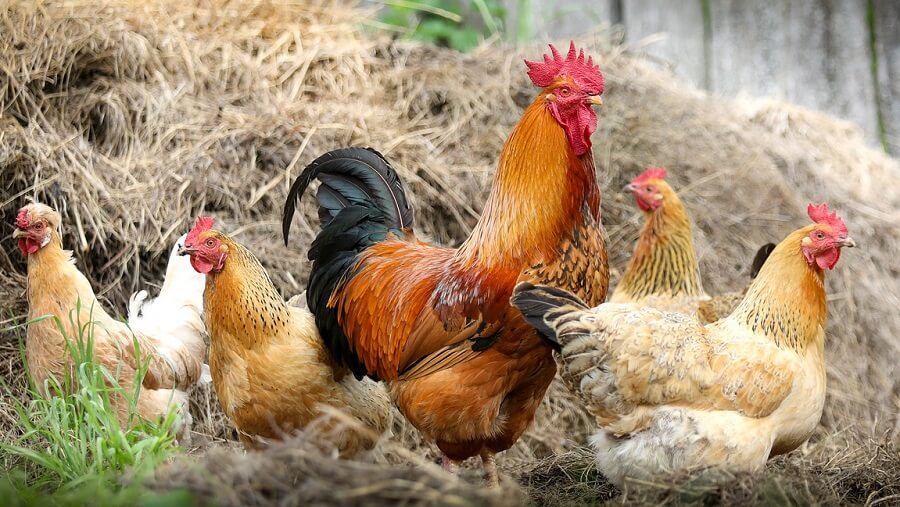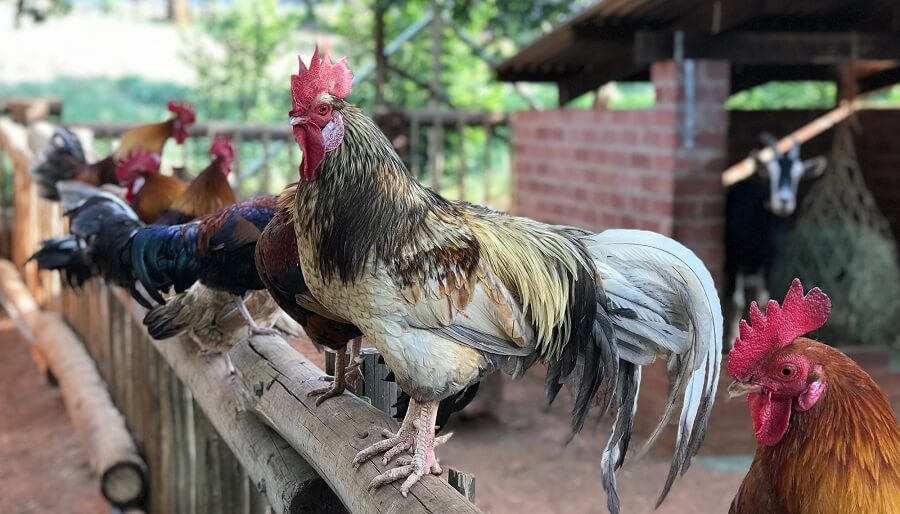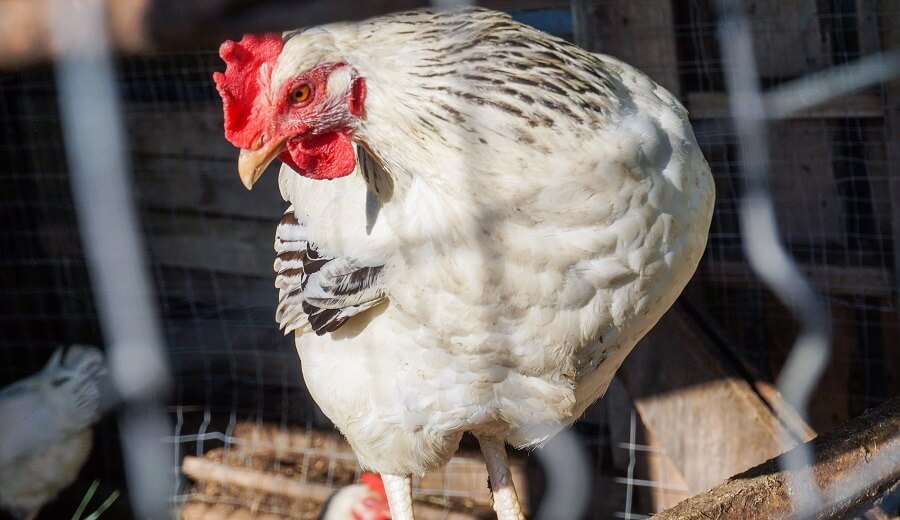Summer is the time of the year when chickens are most vulnerable to heat stroke and death. In some parts of the world, the weather stays hot enough year-round to cause potential issues all year. It is vital that you know how to protect your chickens from heat exhaustion and possible death.
Additionally, properly caring for your chickens during the hot summer months can help to increase their egg-laying production and will keep them much healthier.
This article will cover the steps you can take to keep your flock healthy and cool during the hot months of summer.
Even northern locations can often get hot enough for concern for several weeks during the summer. Cold-weather flocks can be especially vulnerable during hot weeks.
Later in the article, I’ll cover what breeds of chickens are best-suited for hot weather so you can build a more heat hardy flock.
How To Raise Chickens In Hot Weather
There are several steps that you should take during hot weather to cool your chickens. Even if you have heat-resistant breeds that you are raising, they still need plenty of water and a cool place to rest.
A sudden heatwave can cause unexpected death and distress in a flock because of the rapid increase in temperatures. It also causes problems because owners aren’t as aware of precautions that should be taken to keep chickens safe from extreme heat.
Check out these 10 ways to cool your chickens during hot weather or a heatwave.
1. Provide Plenty Of Shade For Your Chickens
Shade is essential because it provides a place that chickens can go to cool down. It also provides predator protection and gives your ladies a place to hide.
Chickens with dark coloring are especially vulnerable to the sun and heat and will benefit from shade.
Shade can come from bushes and foliage. It can also be a covering over the coop, or shade cloth. Shade cloth usually allows the breeze to blow through and cool the shaded area.
Plus, shade can come in the form of a deck or other structure that chickens can rest under.
2. Supply Cold Water For Hydration
Chickens prefer cold water. Often they will dehydrate rather than drink hot or warm water on a hot day.
That means that it is vital to provide your flock with cool water during the extreme heat of the day.
Make sure that you provide multiple watering options for your chickens. This will allow more birds to hydrate more often and will help to prevent bullying.
Your watering containers should be kept in the shade.
Keep water cool by adding blocks of ice. Chickens will drink cold water and will stay hydrated and cooler better.
3. Provide Water Tubs For Easier Cooling Down
Even if you use a nipple watering system, consider providing several tubs of water for your chickens. Add some adobe bricks or cinder blocks to the water. The bricks will absorb the water and cool down.
Your chickens will love to stand on the bricks. It will cool their legs and feet down and help them to regulate their body temperature.
Chickens don’t often like to stand in water, but they do like to have their feet cool when they are getting overheated. Chickens that do stand in the water for periods of time can develop foot issues and a cool brick helps to prevent this.
The cinder blocks or bricks provides the perfect way for them to stay cool without avoiding the water.
4. Provide Extra Electrolytes
Just like people, chickens lose a lot of electrolytes in the heat. It’s important to replenish them so they don’t face dehydration.
You can purchase electrolytes specific for chickens that have the right amount of nutrients for your flock.
In a pinch, you can also add baking soda at a 2% concentration to their water. Gatorade or Pedialyte can also work to help hydrate chickens.
5. Avoid Scratch Grains During Summer Months
Feeding your chickens scratch grains is a great way to make use of existing resources and save money on chicken feed. However, during the summer it can increase their risk of heat exhaustion.
That’s because digesting grains takes more energy and will heat up chicken’s internal temperature. Instead, use scratch grains during the cooler months to help heat them up.
During the summer, stick to herbs, greens, and a good laying feed. This will provide your hens with the needed nutrients without unnecessarily heating them up more.
6. Feed Chickens In The Morning And Evenings
During the summer, chickens will continue to forage for food during the day. You can feed them in the mornings and evenings when it is cooler. The energy they take to digest heavier foods can be used when it’s cooler outside.
This helps to keep them cool.
7. Offer Frozen Treats
Chicken love devouring a frozen treat. This can be a frozen watermelon or watermelon rinds. It can also include frozen herbs and greens frozen in ice cube trays.
You don’t have get fancy. Even frozen berries and leafy greens will make your chickens happy. Frozen corn, cucumber slices, or bananas will also delight your chickens.
In many cases a froze jug of water gives them something to peck at. But, take the plastic off first!
8. Provide Open Dirt For A Good Dust Bath
One of the ways that chickens cool off, as well as clean themselves, is through a dust bath. The dust helps to clean their feathers of bugs and pests, but also provides a good way for air to flow through.
Let your chickens have access to an area of dirt where they can take a dust bath. If possible, provide shade over the area so they can have access to cool dirt.
9. Use Open-Air Nesting Boxes
Hens love privacy when laying eggs, but in the extreme heat, they will often stop laying. You can help your girls to continue to lay by providing open-air nesting boxes. This can be something as simple as a cardboard box lid or a basket with straw inside.
You can realize that it’s too hot in their regular nesting boxes if you start finding eggs under bushes and in other shaded areas. This can be a signal that the closed boxes aren’t comfortable for your girls.
10. Provide Cooler Options In The Coop
Consider cooling your coop down. Make sure it has plenty of ventilation. That’s also important in the winter because moisture and mold, not cold air, will usually make chickens sick.
Consider running a fan in the coop when it gets extremely hot to keep the air moving. You can also freeze a jug of water and blow the air around it. That will help to cool the air in the coop.
Make sure that you have plenty of shade over your coop to keep the sun off of it.
11. Reduce Your Interactions With Your Flock
The heat will stress out your chickens. Try to keep their stress levels lower by reducing your interactions with them and allowing them to chill.
Don’t pick them up or move them to another area. Holding and petting them will increase their body temperature.
If you have to move them, do it during the cool parts of the day. Even though you are leaving them alone, be sure to monitor your chickens for heat exhaustion so that you can take emergency steps if they show signs of distress.
How To Identify Heat Exhaustion Or Distress In Chickens
Heat exhaustion can cause health problems in chickens. In some cases, it causes death. Chickens that get too hot can simply fall over and die.
Although you probably don’t speak “cluck” there are many ways to identify when your chickens are stressed out from the heat or are in danger.
Chickens that are distressed from the heat and in danger will show the following symptoms:
- Panting: Their beaks will be open constantly and they will breath in short, rapid breaths. This is a sign that your chickens are hot.
- Wings spread consistently: One of the ways that chickens cool down is by spreading their wings. It’s not obvious or as spread as when they fly, but you will notice a subtle wing lifting that allows air to flow under the wings.
- Lethargic, or not moving: Lethargic chickens are not doing well. If your chickens are not moving or have become lethargic, then treat them immediately to help cool them down.
- Staggering: This is another sign that your chickens are struggling.
If your chickens are displaying symptoms of overheating or heat exhaustion, then make sure that you act to help keep them safe.
Three are several steps you can take to immediately help cool down your chickens.
- Bring them into your house or a cooler garage or shed
- Wrap them in a cool wet towel
- Feed them frozen treats
How Hot is Too Hot For Chickens?
A chicken’s body temperature stays between 104-107 Fahrenheit. The ideal temperature for them is between 55-75 degrees Fahrenheit (about 13-24 degrees Celsius).
When the weather gets hotter than this, it becomes more difficult for chickens to cool down. In addition, higher humidities become problematic. Humidity levels above 75% make it much harder on chickens.
Do Chickens Stop Laying When It’s Hot?
Summer is usually the optimal time for chicken egg-laying. Most chickens lay the highest number of eggs in the summer because of the longer daylight hours. However, the summer heat can also cause chickens to stop laying eggs.
When the temperature rises or humidity makes it feel hotter than normal, hens will often slow down the number of eggs they lay. This can be frustrating if you are depending on the eggs for your family or to sell.
You can keep your hens egg-laying at optimal production by taking steps to keep your hens cooler during heat waves and hotter summer months.
What Chickens Are Best Suited For Hot Climates?
Generally speaking, smaller, light-colored chickens do well in hot climates. Those with larger combs and wattles also do better because body heat is lost in the combs and wattles.
Black and dark-colored chickens have a harder time in the heat because their feathers absorb heat so much more than lighter colored chickens.
Plus, larger chickens can also carry more body heat and have a hard time cooling down.
Best Hot Weather Meat Chickens
Most meat chickens have been bred to grow quickly and to be more lethargic as a whole. Because they grow quickly, they usually have a harder time getting rid of body heat than other breeds of chickens.
Because of that, there aren’t a lot of meat chickens that do well in very hot climates. Those that raise meat chickens in hot climates have to take extra precautions to keep their chickens cooler and to keep them from dying of overheating.
Chickens are often kept in cooled sheds and other protective shelters that keep the natural heat out.
You may notice that the most heat tolerant meat chickens are heritage chickens. None of the modern breeds do very well in extreme temperatures.
However, if you are looking for a more natural way to raise chickens, but live in a hot area, here are three breeds that do well in the heat.
- Crevecoeur: 8 lbs, 100 eggs a year
- Welsummer chickens: 7 lbs, 160-200 eggs a year
- Sultan: 6 lbs, 50 eggs a year
I’ve noted the roosts’ normal weight and the hens’ egg-laying abilities. Click on any breed to learn more about it.
Best Hot Weather Egg-Laying Chickens
Generally speaking, heritage chickens are more adapted to extreme weather, but there are also some newer hybrid chicken breeds that do well in hot temperatures.
Plus most of the Mediterranean chicken breeds do well in the heat as their ancestors have climatized over decades of breeding.
The best egg-laying chicken breeds for hot climates are:
- Ancona: 4.5 lbs, 220 eggs a year
- Leghorn: 7 lbs, 320 eggs a year
- Lohmann Brown: 5 lbs, 320 eggs a year
- Rhode Island Red: 8.5 lbs, 200 eggs a year
- Fayoumi: 4.5 lbs, 150-200 eggs a year
- Malay: 9 lbs, 70 eggs a year
- Minorca: 8 lbs, 170-200 eggs a year
- Modern Game: 6 lbs, 50 eggs a year
- Polish: 6 lbs, 100-200 eggs a year
- Silkie: 4 lbs, 100 eggs a year. Lays green eggs
- Naked Neck: 7 lbs, 120 eggs a year
- Empordanesa: 6.5 lbs, 160-180 Empordanesa Chicken: Dark Brown Eggsdark brown eggs a year
- Welsummer: 7 lbs, 160-200 brown speckled eggs a year
Best Hot Climate Dual Purpose Chickens
- Andalusian: 7 lbs, 165 eggs a year
- Australorp: 8.5 lbs, 250-300 eggs a year
- Buckeye: 9 lbs, 180 eggs a year
- Hamburg: 5 lbs, 225 eggs a year
- Houdan: 8 lbs, 180 eggs a year
- Langshan: 9.5 lbs, 200-290 eggs a year
- Plymouth Rock: 9.5 lbs, 220-290 eggs a year
Rarer Mediterranean Breeds That Love The Heat
In the United States, many Mediterranean breeds aren’t as common. Here is a list of the Mediterranean chicken breeds that do well in the heat.
- Black Faced White Spanish Chicken (Andalusian)
- Hamburg
- Appenzeller Spitzhauben
- Golden Campine
- Golden Lakenvelder
- Mille Fleur d’Uccle
- Sicilian Buttercup
- Catalina
- Penedesenca chickens
- Empordanesa
- Minorca
- Leghorn
- Fayoumi
Conclusion
Most chickens can survive with the right resources during heat spells, hot summers, and in hot climates. If you are looking for a breed that requires less work, then create your flock out of breeds that are better acclimated to the heat and that will require less monitoring and work to keep them cool.
But, if you live in a place that also gets extremely cold in the winter, then check out our cold climate chicken breeds here. Some chicken breeds do well in both temperature extremes!
My Favorite Chicken and Duck Supplies
This list contains affiliate products. Affiliate products do not cost more but helps to support BestFarmAnimals and our goal to provide farm animal owners with accurate and helpful information.
Manna Pro Oyster Shell keeps eggs strong. Before I gave my chickens oyster shell, I had the oddest eggs, many with weak and irregular shells. Now, I don’t have an issue.
Layer Feed by Manna Pro. I like pellets rather than crumbles as my chickens eat them better and less gets wasted or scavenged by rodents. A good layer feed makes the difference in hens laying many more eggs.
My chickens love this mealworm treat, which gives added protein, something that’s great during molting and winter months.
There are many ways to feed and water your chickens. I like this food and water setup the best because it reduces waste, saves me time feeding and watering, and keeps the food fresh longer. Except, in the winter, I use a heated waterer. The only problem is the heated waterers need to be replaced every few years.
I love this chicken veggie hanger. It makes it easy to give your chickens produce from the garden and keep them occupied in the winter with a fresh head of lettuce.
These chicken toys are a hoot! They will help curb bullying and keep your chickens active, especially in the winter when hens tend to get more lethargic.



